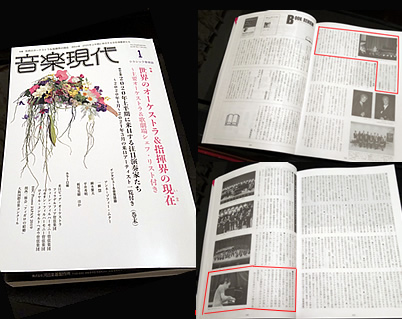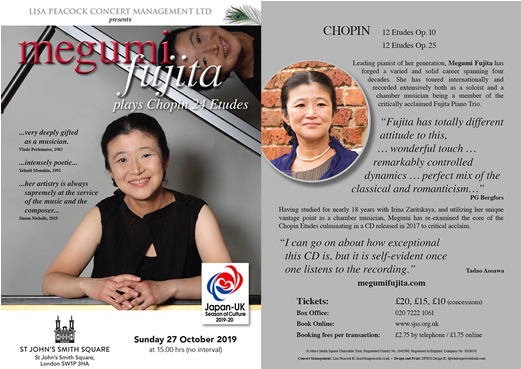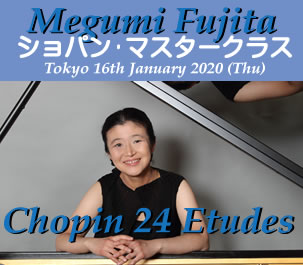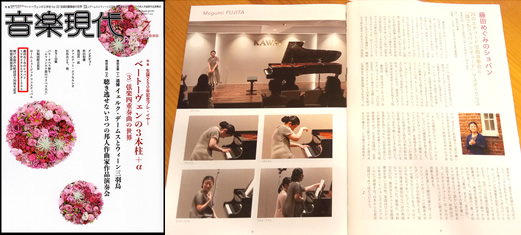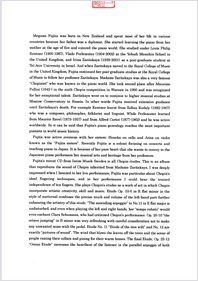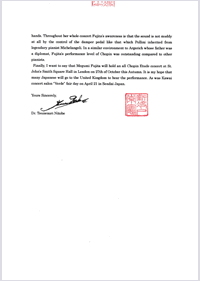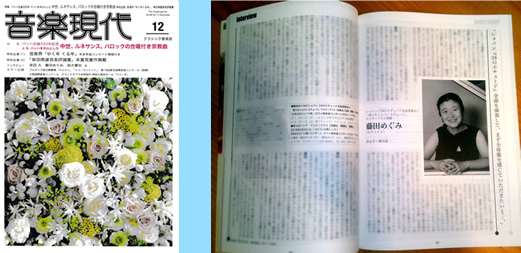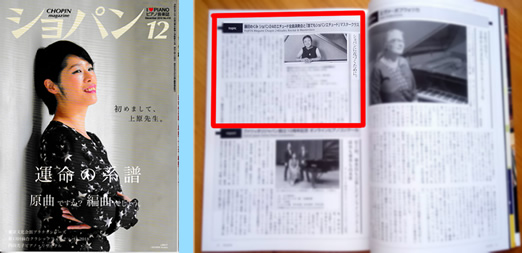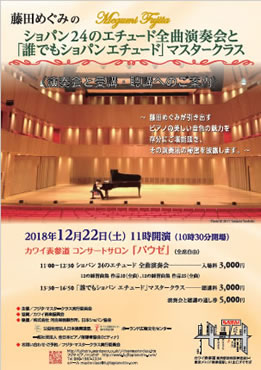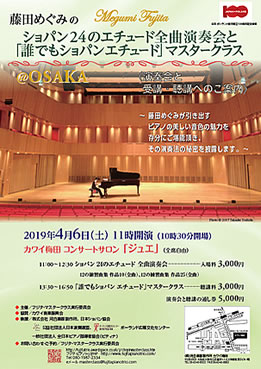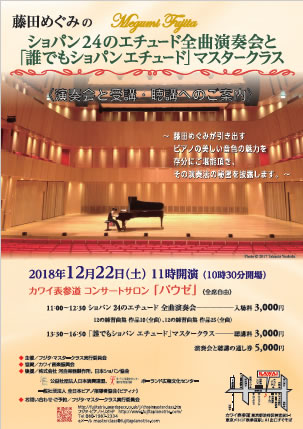Update10 Sep'20
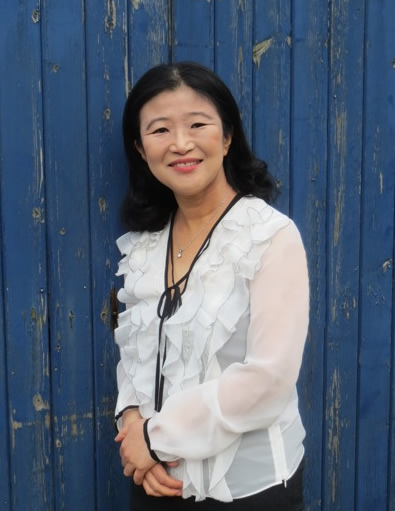
©Matthijs Broersma
The Complete 24 Chopin Etudes Recital
Megumi Fujita (piano)
Chopin
Complete 24 Etudes Recital
12 Etudes Op.10, 12 Etudes
Op.25
Sunday 27th October 2019 at 3pm
St
John's Smith Square, London
Review on Japanese Ongaku Gendai Magazine!
Ongaku Gendai Magazine January 2020 (translated from original Japanese)
Megumi Fujita Recital in London
Since the controversial Brexit referendum, won by a tiny margin, the remainers are still going strong and the future of the UK has been hanging in a balance for three years.
The leavers and the remainers continues their battle right outside the Houses of Parliament. Once you turn a corner in front of the Houses of Parliament, the hustle and bustle suddenly becomes silent, and the mighty white St John’s Smith Square appears. This is the venue for Megumi Fujita’s recital.
The church was built around 300 years ago in a Baroque style, but was completely destroyed in the Second World War. It was rebuilt 30 years ago while keeping the original exterior, and was reborn as one of the main London concert halls. With its notable acoustics, the hall is also used for BBC music programmes.
Megumi Fujita gave a Complete Chopin Etudes recital here on 27th October.
She sat at the piano with a quiet smile and strong inner determination, and commenced the first Etude in C major like a roaring great cascading waterfall. It drew us in one continuous streak, without an interval, right through to the last Etude ‘Ocean’ of scrolling continuous arpeggio with both hands, she expressed Chopin’s multitude of characters by being sweet, sometimes severe, and refreshing at times, she treated us to ‘Megumi’s World’ incorporated with her adoration to Chopin.
Tasmin Little, the famous British violinist and Megumi’s former school friend from the Menuhin school was in the audience, and was keenly listening to the performance.
News
15th June 2019
A 2 page colour spread article on Chopin 24 Etudes Concert & Masterclass in Sendai (Apr 2019) has appeared (with photos!) on July issue of Japanese Ongaku Gendai Magazine!
English Translation:
“Ongaku Gendai” Magazine July,2019
Chopin by Megumi Fujita
Complete 24 Chopin Etude Recital
and ‘Chopin Etudes for everyone’ Masterclass
(at Kawai Sendai, Concert Salon “Verde” on 21st April, 2019)
Megumi Fujita was born in New Zealand and spent most of her life in various countries because her father was a diplomat. She started learning the piano from her mother at the age of five and entered the piano world. She studied under Louis Philip Kentner (1905-1987), Vlado Perlemuter (1904-2002) at the Yehudi Menuhin School in the United Kingdom, and Irina Zaritskaya (1939-2001) as a post-graduate student at Tel Aviv University in Israel.
And when Zaritskaya moved to the Royal College of Music in the United Kingdom, Fujita continued her post-graduate studies at the Royal College of Music to follow her professor Zaritskaya. Madame Zaritskaya was also a very famous "Chopinist'' who was known in the piano world. She took second place after Maurizio Pollini (1942-) in the sixth Chopin competition in Warsaw in 1960 and was recognized for her exceptional talent. Zaritskaya went on to continue to higher musical studies at Moscow Conservatory in Russia.
In other words Fujita received extensive guidance until Zaritskaya's death. For example Kentner learnt from Zoltan Kodaly (1882-1967) who was a composer, philosopher, folklorist and linguist. While Perlemuter learned from Maurice Ravel (1875-1937) and from Alfred Cortot (1877-1962 ) and he was active worldwide. So it can be said that Fujita's piano genealogy reaches the most important pianists in world music history.
Fujita was active overseas with her sisters ; Honoka on cello and Arisa on violin known as the "Fujita sisters". Recently Fujita is a soloist focusing on concerts and teaching piano in Japan. It is because of her pure heart that she wants to convey to the Japanese piano performers her musical arts and heritage from her professors.
Fujita was active overseas with her sisters ; Honoka on cello and Arisa on violin known as the "Fujita sisters". Recently Fujita is a soloist focusing on concerts and teaching piano in Japan. It is because of her pure heart that she wants to convey to the Japanese piano performers her musical arts and heritage from her professors.
Fujita's recent CD from Intim Musik Sweden is all Chopin etudes. This is an album that reproduces the sound of Chopin inherited from Madame Zaritskaya. I was deeply impressed when I listened to her live performance, Fujita was particular about Chopin's ideal fingering techniques, and in her performance I could hear the trained independence of ten fingers. She plays Chopin's etudes as a work of art in which Chopin incorporate artistic creativity, skill and music.
Etude Op. 10-6 in E flat minor in the style of nocturnal combines the precise touch and volume of the left -hand part further enhancing the artistry of this etude. "The ascending arpeggio" in No.11 in E flat major is undisturbed, and even when playing the left and right hands, her "tempo rubato" would even enchant Clara Schumann, who had criticized Chopin's performance. Op. 25-10 "the octave jumping'' in B minor was very refreshing with careful consideration not to make any unwanted noise with the pedal Etude No. 11 "Etude of the tree wilt' ' and No. 12 are exactly "pictures of sound ". The wind that blows the leaves off the trees and the scene of people raising their collars and pining for their warm homes. The final Etude, Op. 25-12 "Ocean Etude" increases the heart at of the listener in the parallel arpeggio of both hands.
Throughout her whole concert Fujita's awareness is that the sound is not muddy at all by the control of the damper pedal like that which Pollini inherited from legendary pianist Michelangeli. In a similar environment to Argerich whose father was a diplomat, Fujita's performance level of Chopin was outstanding compared to other pianists.
Finally, I want to say that Megumi Fujita will hold an all Chopin Etude concert at St. John's Smith Square Hall in London on 27th of October this autumn. It is my hope that many Japanese will go to the United Kingdom to hear the performance. As was Kawai concert salon "Verde" fair day on April 21 in Sendai Japan.
Yours Sincerely,
Dr. Tsunenori Nitobe
23rd Feb 2019
An 2 page spread article on Chopin 24 Etudes Concert & Masterclass (Dec, 2018) has appeared (with photos!) on March issue of Japanese Ongaku Gendai Magazine!
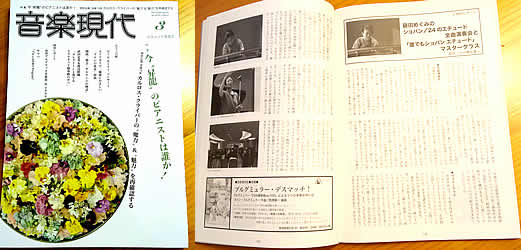
18th Nov 2018
Megumi's interview on her upcoming Chopin Etudes Concert/Masterclasses in Tokyo and Osaka has been published on leading Japanese music magazines Music Gendai and Chopin!
22nd
December 2018 (Sat)
Kawai Omotesando, Tokyo
6th
April 2019 (Sat)
Kawai Umeda, Osaka
Megumi Fujita
Chopin
24 Etudes Recital and
'Chopin Etudes for Everyone' Masterclass
http://fujitatrio.awardspace.co.uk/megumi/chopinmasterclass.htm
NEW!* Listen to Mozart Variations, Mozart Fantasy in C minor and Smetana Piano Trio, recorded at Kawai Omotesando 'Pause' Hall in May 2018 on YouTube!
Mozart Twelve Variations on "Ah vous dirai-je, Maman"
Mozart Fantasia in C minor, K.475
Smetana Piano Trio in G minor Op.15
30 Oct 2018 (Tue) 7:30pm
St. Gabriel’s
Church, Warwick Square,
Pimlico, London, SW1V 2AD
https://www.eventbrite.co.uk/e/a-first-world-war-100th-anniversary-concert-featuring-pianist-megumi-fujita-tickets-49212690482?aff=ehomecard
First
World War Anniversary Concert
Vaughan
Williams 'Suite of Six pieces'
Ravel 'Le tombeau de Couperin'
Stimpson Variations on Papaver Rhoeas World
Premiere
Granados 'Quejas o La Maja y el Ruisenor’
Debussy 'L'Isle Joyeuse'
22nd
December 2018 (Sat)
Kawai Omotesando, Tokyo
Megumi Fujita
Chopin
24 Etudes Recital and
'Chopin Etudes for Everyone' Masterclass
http://fujitatrio.awardspace.co.uk/megumi/chopinmasterclass.htm
7th September 2017
From the programme of Megumi Fujita's Chopin Complete 24 Etudes Recital today at Kawai Omotesando 'Pause' Hall, Tokyo:
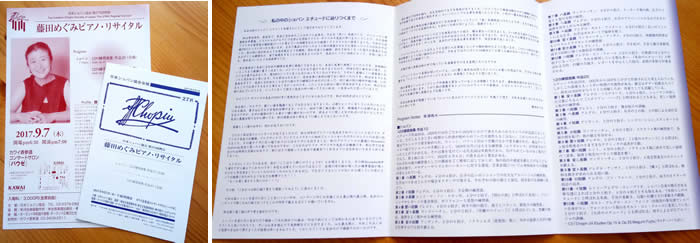
My journey to Chopin Etudes
Thank you for coming to hear my Chopin Etudes tonight.
I was one of those typical
‘model student’ in my younger years, as I can immediately play whatever
my teachers’ instructed. When I found out the possibility to study with
Irina Zaritzkaya at Tel Aviv University, with great difficulty, I somehow
managed to get my parents - who were more inclined towards me studying
in the US - to let me study in what was a war torn Israel.
I think I was getting a twice weekly lessons then. I noticed my playing
improving magically at an amazing pace. What I could only imagine - the
breathtaking moments, tearful sorrow, deep emerging uncontainable anger
– I was capable to expressing it with my playing. The lessons for me then,
were like a dream from another world.
I was mimicking everything my teacher said with perfection. Really with amazing detail. I wrote down everything through to a minute detail into my music. I participated in many competitions, so I played the same pieces to her over and over, and wrote in even more detail. Every twice weekly lessons were spent intensively, so one can imagine how much I have improved. However, deep within me, I was insecure, and lacked confidence. I was studiously trying to copy everything my teacher said, but never even thought about applying the idea in other pieces. I did have a level of uncertainty, but as long as I can have lessons with my teacher, wherever she is, I will be set forever.
Irina Zaritskaya died suddenly in 2001, when I was in my mid–thirties.
I was abruptly left alone to learn new pieces from scratch. I was fine performing music that I was taught, but new pieces are different. I can do what was printed, but emotions did not synchronise with what I was playing. Even if I literally prayed while performing passages that needed to sound like a prayer, the sound never came out as I wished.
Something was missing from what is definitely a beautiful music.
I had a lot of concerts scheduled at the time, so I went to my late teacher’s daughter Alexandra Andrievsky, who was of similar age to me, in London, and when she moved to Canada, I went to Canada to have lessons. Alexandra Andrievsky, printed at the end of my biography is my late teacher, Irina Zaritskaya’s daughter. I had by then, completely given up making music by myself.
In one of the lessons in Canada, I asked ‘how shall I play this phrase?’. Alexandra went silent for a moment and then told me what to do. Now that I think back, perhaps she didn’t go silent to think, but were listening out for a doorbell or a phone, but to me, a person desperate for the answer, the silence felt like a lightening bolt. ‘Should I think deeper!!?’
At that moment I decided to to use my head and search for answers.
After that, I stopped going for lessons, and limited listening to other performers in concerts and CDs to a bare minimum. I have only listened to a handful of recordings of the pieces I am performing for the past decades.
I have finally started to think deeper and deeper in my own mind.
At first, the new pieces which I learned by myself lacked something. I read widely, and went to museums. I tried pouring all my emotions, literally to the point of crying, but the results were not quite there. But I really wanted to find the answers by myself.
After few years a revelation presented itself: Pianistic tone colour varies by the weight transmitted from the arm to the keyboard. Simple, but this was the most important discovery.
Next revelation came when I found that there are perfect sound for final chords. It was as surprising as a baby finding out that mummy has a name too!
After that, small discoveries followed almost everyday, and eventually mounted enough that audiences began to notice and compliment. I am still discovering something new everyday. I have finally gained confidence to make my own unique performance.
What I hope you are about to hear is a true representation of the music I hear in my mind.
Even though this is named ‘Etude’, it was composed by Chopin, a composer of many heart rendering music. I hope to recreate what I think Chopin himself imagined.
I realise this may differ from all the wonderful recordings from the past, and some of you will find it disconcerting. My performance is what I envisage Chopin felt and I have recorded it on a CD and will perform to you tonight.
I will be most delighted if you could enjoy with me my performance of what I think Chopin himself imagined.
Megumi Fujita
23rd July 2017
CHOPIN 24 Etudes CD Launch Concerts!
23rd July 2017
(Sun) 3pm St
Johns Smith Square, London (3 Etudes)
7th September 2017 (Thu) 7pm Kawai
Omotesando, Tokyo, JAPAN
24th October 2017 (Tue) Spira, Jonkoping, SWEDEN
28th November 2017 (Tue) 6:45pm Caledonian
Club, London, UK
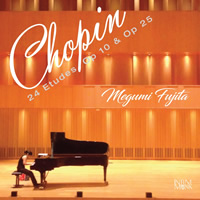
https://naxosdirect.se/labels/intim-musik-431
'Do listen to the CD in the record shop – and I am sure you will love Megumi Fujita's way of playing and her Chopin's interpretation.' P-G Bergfors
31st May 2017
A review of Megumi's Chopin 24 Etudes CD:
The greatest piano studies of all time.
As Frédéric Chopin was also a pianist, he studied the piano extensively. Unlike his friend Liszt, he, as a concert pianist, disliked large venues and big audiences. He preferred performing at intimate surroundings.One will recognize such differences when listening to the newly released CD (Intim Musik label) of Chopin's etudes op.10 and 25 performed by Megumi Fujita, widely known around the world as a chamber musician in a piano trio with her two sisters.
What I mean is, that these pieces are usually a showcase for how technically brilliant, strong, fast and skilled a young pianists can execute the Chopin's etudes. Fujita has totally different attitude to this, as shown from the very first Etude, op. 10 No. 1, in C major.
She has all the technique required of a modern pianist to play at any speed, but she refrains from getting praise this way. With wonderful touch and remarkably controlled dynamics, and perfect mix of the classical and romanticism born out of Chopin's heart (Chopin loved Mozart’s music!), she takes the tempo at a slightly slower pace, with tenderness and butterfly's touch, thus drawing the music away from the earth shattering fast-paced virtuosi.
With the risk of misunderstanding,
I would like to call Fujita's interpretation feminine in the very best
meaning of that word.I cannot pick "best tracks" in this collection.
Everything is so good. A personal musical favourite among them is Etude
Op.25 No.1 in A flat major. Do listen to the CD in the record shop – and
I am sure you will love Megumi Fujita's way of playing and her interpretation
of Chopin.
Recording quality is of the highest standard as well as the photos, the
booklet and the elegant notes for the music as usual from Intim Musik,
is pleasure to the eye and contributes to the overall experience in the
most favourable way.
P-G Bergfors
Translated from original Swedish
A
review from Megumi's Piano Recital in Horsham,
October 2011
Stunning recital from Fujita
that highlighted sensuous beauty and rich sound
Megumi Fujita, Horsham Music circle
HORSHAM music circle's 70th season continued on Saturday evening with
a stunning recital at the Drill Hall given by Japanese pianist, Megumi
Fujita.
Her programme opened with Beethoven's Waldstein Sonata with its vast developed
first movement, followed by a restrained slow movement which leads straight
into the triumphant rondo finale. It was played with flawless artistry.
Rachmaninov's Twenty Variations on the La Folia theme are wide-ranging
in imagination, admirably concise and essentially romantic. They received
a very fine performance, well paced with flamboyant technique.
Brahms's Three Intermezzos are much loved late romantic pieces which were
superbly played with all the warmth, affection and peaceful contentment
demanded within the music.
Le Tombeau de Couperin by Ravel is a suite of six pieces dedicated to
friends of the composer who lost their lives in the First World War. Although
inspired by the Baroque suites it is composed of a wide range of styles.
Megumi Fujita brought out all the classical purity, sheer sensuous beauty
and lush richness of the sound.
The final ovation demanded an encore when we had the great pleasure of
one of Rachmaninov's Preludes. It made a fitting conclusion to an evening
of the very finest piano music, all magnificently played with great charm.
West Sussex County
Times 20th Oct 2011 G.T.
4th Novembeer 2010
Megumi's
second disc is out now!
http://www.classicsonline.com/catalogue/product.aspx?pid=1041192
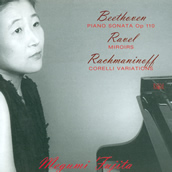
22nd December 2008
New Dvorak 'Dumky' Piano Trio/Smetana Piano Trio CD is coming out soon!
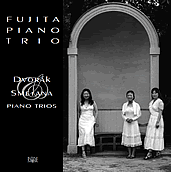
30th Sept 2008
Megumi will playing the Rachmaninov
Piano Concerto No.2 with Anne Kimber (Cond) and the Plymouth
Symphony Orchestra on the 19th November! It will be at the Guildhall,
Plymouth.
22nd May 2007
Ravel
Trio 1st & 2nd movement live from
the 19th May concert is on Podcast from Dartmouth
Festival Website!
3rd
February 2007
Photos from Hyogo, Japan concert in the Photo
page!
2nd
February 2007
Megumi
has started her Blogs!
For English :![]() For Japanese :
For Japanese :![]()
4th January 2007
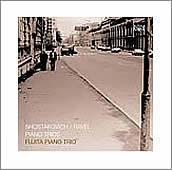
Happy New Year!
Our latest CD of Shostakovich Trios No.1 & 2 and Ravel Trio is coming
out very soon.
Details on our CD
page!
2nd
December 2006
Megumi's
review of her Wigmore Hall recital came out!
"The most striking feature of Megumi Fujita's
playing in the Wigmore Hall on 1 October was the sheer beauty of sound
she drew from the piano, always brilliantly singing yet subtly varied
according to which masterpiece she performed....this was among the best
recitals I've heard this year to mark the 150th Anniversary of Schumann's
death"
Musical Opinion Nov/Dec 2006 Max Harrison
28th
March 2006
Megumi's
review of her Rachmaninov CD came out!
"Ms Fujita plays it exquisitely...Fujita
has a perceptive ear for the poetic virtues of this music as well as having
all the virtuosity needed to capture the stormy atmosphere in some of
the preludes. "
Goteborg Posten 2006
2th
October 2005
Megumi's
review of the June Wigmore Hall recital came out!
"...solid technique and beautiful touch.
The most magical aspect of her playing was the endless variety and nuance
of colour which she searched for and extracted out of her instrument....bewitching
tonal palette..." (Musical
Opinion Sept/Oct 2005)
2nd
May 2005
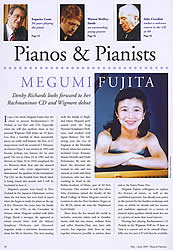 Megumi
has been featured in the Piano & Pianist issue of the Musical Opinion
Magazine (May/June 2005)!
Megumi
has been featured in the Piano & Pianist issue of the Musical Opinion
Magazine (May/June 2005)!
"...(Megumi
Fujita) was marvellous mature and confident...faultless technique and
tone...
Tour de force in all respects."
Musical
Opinion, Wigmore Hall
![]() Rachmaninov
Prelude Op.23 No.4 in D major
Rachmaninov
Prelude Op.23 No.4 in D major
home profile reviews cd schedule photos contact chatterbox links
